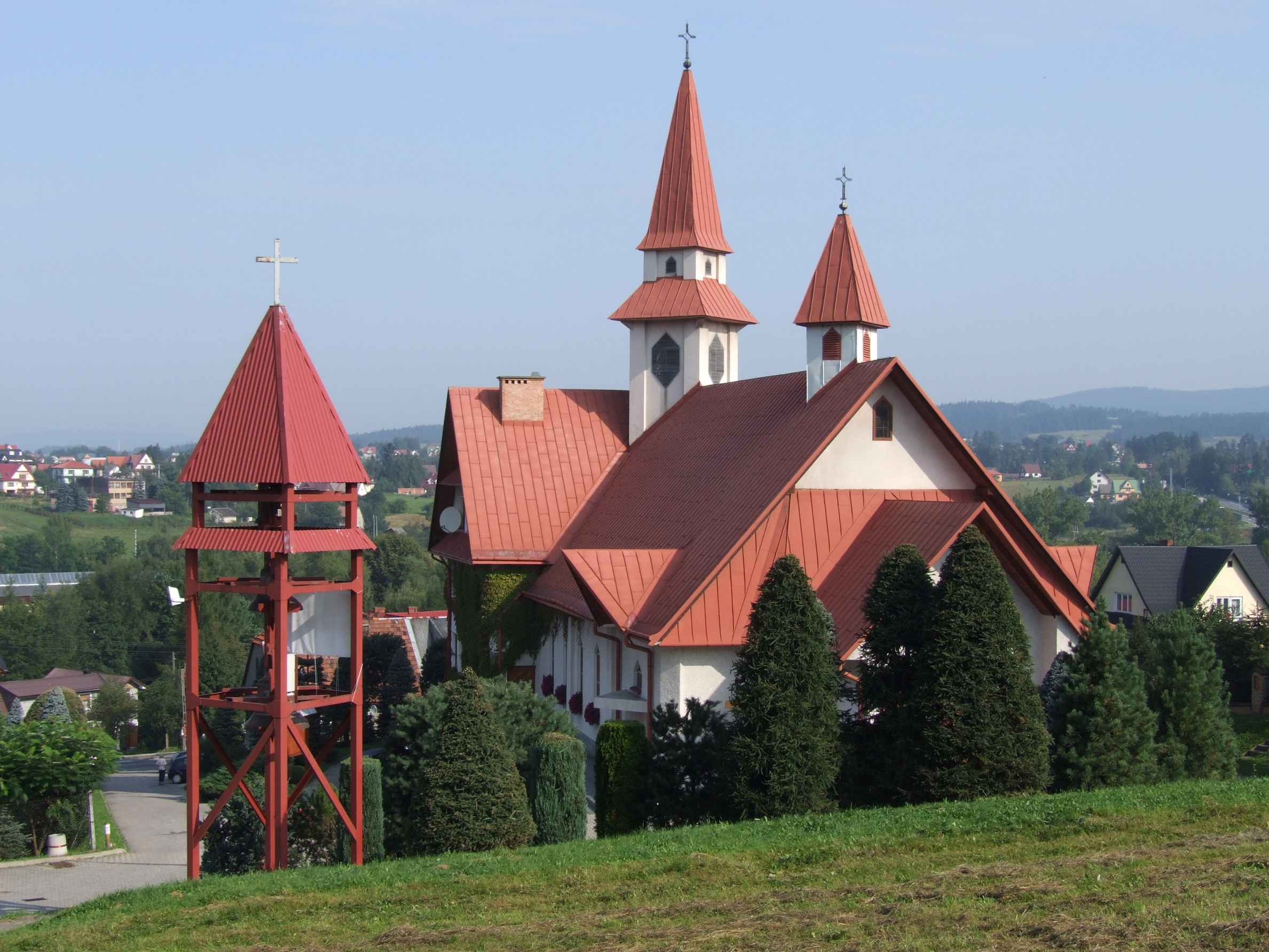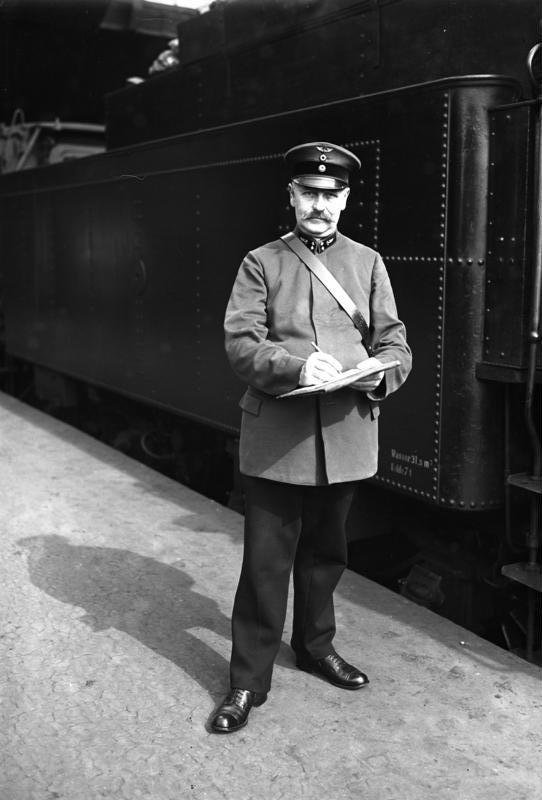|
PKP Class OKz32
PKP Class OKz32 is a Polish tank locomotive of Polskie Koleje Państwowe, designed for hauling passenger trains in mountain regions, built in 1934-1935. The designation stood for passenger (O) tank (K) 2-10-2 (z) steam locomotive accepted in 1932. History The locomotive was designed in Poland specially for passenger traffic on mountain route Kraków – Zakopane in Tatra Mountains. It was constructed in H. Cegielski works in Poznań, under direction of Prof. Antoni Xsiężopolski. The first locomotive was made in 1934 and appeared successful. A series of 25 in total was built in 1934-1935 for Polskie Koleje Państwowe. The locomotive could haul heavier trains (350 tonnes), than German-origin TKt1 and TKt2 (250 tonnes), and was faster. They were also used with freight trains. During World War II 18 locomotives were captured by the Germans and impressed into service as DRG class 953, with numbers 301 to 318 (two of them were first captured by the Soviets, then by the Germans ... [...More Info...] [...Related Items...] OR: [Wikipedia] [Google] [Baidu] |
2-10-2
Under the Whyte notation for the classification of steam locomotives, represents the wheel arrangement of two leading wheels, ten powered and coupled driving wheels, and two trailing wheels. In the United States of America and elsewhere the is known as the Santa Fe type, after the Atchison, Topeka and Santa Fe Railway that first used the type in 1903. Overview The wheel arrangement evolved in the United States from the 2-10-0 Decapod of the Atchison, Topeka and Santa Fe Railway (ATSF). Their existing 2-10-0 tandem compound locomotives, used as pushers up Raton Pass, encountered problems reversing back down the grade for their next assignments since they were unable to track around curves at speed in reverse and had to run very slowly to avoid derailing. Consequently, the ATSF added a trailing truck to the locomotives which allowed them to operate successfully in both directions. These first locomotives became the forerunners to the entire family. The trailing truck allows a ... [...More Info...] [...Related Items...] OR: [Wikipedia] [Google] [Baidu] |
World War II
World War II or the Second World War, often abbreviated as WWII or WW2, was a world war that lasted from 1939 to 1945. It involved the vast majority of the world's countries—including all of the great powers—forming two opposing military alliances: the Allies and the Axis powers. World War II was a total war that directly involved more than 100 million personnel from more than 30 countries. The major participants in the war threw their entire economic, industrial, and scientific capabilities behind the war effort, blurring the distinction between civilian and military resources. Aircraft played a major role in the conflict, enabling the strategic bombing of population centres and deploying the only two nuclear weapons ever used in war. World War II was by far the deadliest conflict in human history; it resulted in 70 to 85 million fatalities, mostly among civilians. Tens of millions died due to genocides (including the Holocaust), starvation, ma ... [...More Info...] [...Related Items...] OR: [Wikipedia] [Google] [Baidu] |
Polish State Railways Steam Locomotives
Polish may refer to: * Anything from or related to Poland, a country in Europe * Polish language * Poles Poles,, ; singular masculine: ''Polak'', singular feminine: ''Polka'' or Polish people, are a West Slavic nation and ethnic group, who share a common history, culture, the Polish language and are identified with the country of Poland in C ..., people from Poland or of Polish descent * Polish chicken * Polish brothers (Mark Polish and Michael Polish, born 1970), American twin screenwriters Polish may refer to: * Polishing, the process of creating a smooth and shiny surface by rubbing or chemical action ** French polishing, polishing wood to a high gloss finish * Nail polish * Shoe polish * Polish (screenwriting), improving a script in smaller ways than in a rewrite See also * * * Polonaise (other) {{Disambiguation, surname Language and nationality disambiguation pages ... [...More Info...] [...Related Items...] OR: [Wikipedia] [Google] [Baidu] |
Railway Locomotives Introduced In 1934
Rail transport (also known as train transport) is a means of transport that transfers passengers and goods on wheeled vehicles running on rails, which are incorporated in tracks. In contrast to road transport, where the vehicles run on a prepared flat surface, rail vehicles (rolling stock) are directionally guided by the tracks on which they run. Tracks usually consist of steel rails, installed on sleepers (ties) set in ballast, on which the rolling stock, usually fitted with metal wheels, moves. Other variations are also possible, such as "slab track", in which the rails are fastened to a concrete foundation resting on a prepared subsurface. Rolling stock in a rail transport system generally encounters lower frictional resistance than rubber-tyred road vehicles, so passenger and freight cars (carriages and wagons) can be coupled into longer trains. The operation is carried out by a railway company, providing transport between train stations or freight customer faciliti ... [...More Info...] [...Related Items...] OR: [Wikipedia] [Google] [Baidu] |
Chabówka
Chabówka is a village located on the outskirts of the southern Polish town of Rabka, in the Nowy Targ County, Lesser Poland Voivodeship. With population of 1,600 (as for 2006), Chabówka is a popular tourist attraction because of its location near the Gorce Mountains featuring Gorce National Park. It also is an important rail junction, placed along the main line from Kraków to Zakopane, with another connection, to Nowy Sącz, beginning in Chabówka. Near the rail station there is a railway museum, with many examples of Polish-operated locomotives and rail cars. Chabówka shares its name with the northern Slovak village and municipality of Habovka in the Žilina Region. This is because the first settlers of Habovka came from the Polish Polish may refer to: * Anything from or related to Poland, a country in Europe * Polish language * Poles, people from Poland or of Polish descent * Polish chicken *Polish brothers (Mark Polish and Michael Polish, born 1970), American twin scre ... [...More Info...] [...Related Items...] OR: [Wikipedia] [Google] [Baidu] |
Ural Mountains
The Ural Mountains ( ; rus, Ура́льские го́ры, r=Uralskiye gory, p=ʊˈralʲskʲɪjə ˈɡorɨ; ba, Урал тауҙары) or simply the Urals, are a mountain range that runs approximately from north to south through western Russia, from the coast of the Arctic Ocean to the river Ural and northwestern Kazakhstan.Ural Mountains Encyclopædia Britannica on-line The mountain range forms part of the conventional boundary between the regions of and |
Soviet Invasion Of Poland
The Soviet invasion of Poland was a military operation by the Soviet Union without a formal declaration of war. On 17 September 1939, the Soviet Union invaded Poland from the east, 16 days after Nazi Germany invaded Poland from the west. Subsequent military operations lasted for the following 20 days and ended on 6 October 1939 with the two-way division and annexation of the entire territory of the Second Polish Republic by Nazi Germany and the Soviet Union. This division is sometimes called the Fourth Partition of Poland. The Soviet (as well as German) invasion of Poland was indirectly indicated in the "secret protocol" of the Molotov–Ribbentrop Pact signed on 23 August 1939, which divided Poland into "spheres of influence" of the two powers. German and Soviet cooperation in the invasion of Poland has been described as co-belligerence. The Red Army, which vastly outnumbered the Polish defenders, achieved its targets, encountering only limited resistance. Some 320,000 Poles ... [...More Info...] [...Related Items...] OR: [Wikipedia] [Google] [Baidu] |
Deutsche Reichsbahn-Gesellschaft
The ''Deutsche Reichsbahn'', also known as the German National Railway, the German State Railway, German Reich Railway, and the German Imperial Railway, was the German national railway system created after the end of World War I from the regional railways of the individual states of the German Empire. The ''Deutsche Reichsbahn'' has been described as "the largest enterprise in the capitalist world in the years between 1920 and 1932"; nevertheless its importance "arises primarily from the fact that the Reichsbahn was at the center of events in a period of great turmoil in German history". Overview The company was founded on 1 April 1920 as the ("German Imperial Railways") when the Weimar Republic, which still used the nation-state term of the previous monarchy, (German Reich, hence the usage of the in the name of the railway; the monarchical term was ), took national control of the German railways, which had previously been run by the German states. In 1924 it was reorganised ... [...More Info...] [...Related Items...] OR: [Wikipedia] [Google] [Baidu] |
German Occupation Of Poland
German(s) may refer to: * Germany (of or related to) **Germania (historical use) * Germans, citizens of Germany, people of German ancestry, or native speakers of the German language ** For citizens of Germany, see also German nationality law **Germanic peoples (Roman times) * German language **any of the Germanic languages * German cuisine, traditional foods of Germany People * German (given name) * German (surname) * Germán, a Spanish name Places * German (parish), Isle of Man * German, Albania, or Gërmej * German, Bulgaria * German, Iran * German, North Macedonia * German, New York, U.S. * Agios Germanos, Greece Other uses * German (mythology), a South Slavic mythological being * Germans (band), a Canadian rock band * "German" (song), a 2019 song by No Money Enterprise * ''The German'', a 2008 short film * "The Germans", an episode of ''Fawlty Towers'' * ''The German'', a nickname for Congolese rebel André Kisase Ngandu See also * Germanic (other) * Germa ... [...More Info...] [...Related Items...] OR: [Wikipedia] [Google] [Baidu] |
Prussian T 14
The Prussian T 14s were German, 2-8-2T, goods train, tank locomotives operated by the Prussian state railways and the Imperial Railways in Alsace-Lorraine. They were later incorporated by the Deutsche Reichsbahn into their renumbering plan as Class 93.0–4. These locomotives were intended for goods traffic and Sunday excursion services on the lines of the Berlin Stadtbahn. Later the T 14 was also procured by other railway divisions for goods trains on main lines and even for passenger services. In all, 457 of this class was built for the Prussian state railways and 40 for the Imperial Railways in Alsace-Lorraine between 1914 and 1918. Due to uneven weight distribution the axle load on the leading wheels was 169.7 kN higher than that of the driving wheels. The Deutsche Reichsbahn took over 400 T 14s from Prussia and six from the Imperial Railways in Alsace-Lorraine as 93 001 to 93 406. The T 14s from Alsace-Lorraine were given numbers 93 094, 188–19 ... [...More Info...] [...Related Items...] OR: [Wikipedia] [Google] [Baidu] |
Poznań
Poznań () is a city on the River Warta in west-central Poland, within the Greater Poland region. The city is an important cultural and business centre, and one of Poland's most populous regions with many regional customs such as Saint John's Fair (''Jarmark Świętojański''), traditional Saint Martin's croissants and a local dialect. Among its most important heritage sites are the Renaissance Old Town, Town Hall and Gothic Cathedral. Poznań is the fifth-largest and one of the oldest cities in Poland. As of 2021, the city's population is 529,410, while the Poznań metropolitan area (''Metropolia Poznań'') comprising Poznań County and several other communities is inhabited by over 1.1 million people. It is one of four historical capitals of medieval Poland and the ancient capital of the Greater Poland region, currently the administrative capital of the province called Greater Poland Voivodeship. Poznań is a center of trade, sports, education, technology and touri ... [...More Info...] [...Related Items...] OR: [Wikipedia] [Google] [Baidu] |




